REPORT- 2022
All SSI Members
Report of the Seminar
&
Some Decisions at the AGM
Dear Members,
As you know the recent International Seminar on ‘Shakespeare and the
Subconscious’ (A Peep into Mysteries of the Mind) was held in a pleasant
academic ambience and social cordiality. Severalscholarsfrom India and abroad
made valuable presentations. Immediately after the Seminar, Annual General
Body (AGM) was also held on the celebrated day of 23rd April, the Minutes of
which have already been circulated.
A brief report of the Seminar and a note on some of the decisions taken in the
AGM are enclosed for your kind information and valued observations. (Detailed
report on the proceedings of the Seminar is being prepared).
Report
A three-day international seminar on ‘Shakespeare and the Subconscious’
(A Peep into Mysteries of the Mind) was organised by the Shakespeare
Society of India, in collaboration with the Department of English, Delhi
University, from 21st to 23rd April, 2022. The Seminar was held in the well-
equipped S.P. Jain Auditorium at South Campus, Delhi University. It was a pleasant and rewarding experience for all. There was a rich gathering of eminent Shakespeareans, from India and abroad, and young scholars with brilliant ideas
from various parts of India, who contributed bountifully to the academic riches
of the Seminar. The interaction was socially, emotionally, and academically
beneficial and fruitful in several ways. The Seminar witnessed
prolific discussions on different aspects of some important works of
Shakespeare like Hamlet, Othello, King Lear, Macbeth, Romeo and Juliet, and
Antony and Cleopatra.
Inaugural
The inaugural programme began with a word of welcome by the Secretary of the
Society, Prof. Baran Farooqi and the President Dr. Vikram Chopra. It was
followed by an impressive address by Professor Anil Aneja, Head, Department
of English, Delhi University, who expressed high appreciation at this collaborative endeavour. Another hallmark of the Inaugural Ceremony was the Keynote Address by the famous Shakespeare scholar Professor R.W. Desai who dilated on the subconscious workings in the mind of Hamlet. The next part of
the three-day Seminar was also loaded with scholarly presentations and lively
discussions.
Sessions
The first in-person session on the first day was chaired by Professor Rajiva
Verma; the second by Professor Baran Farooqi, and the third by Professor
Subhajit Sen Gupta.
The second day began with online presentations by scholars
from as far as Canada, USA, Saudi Arabia, and other parts of India. The session
was chaired by Dr. Rita Banerjee. The morning in-person session was chaired
by Professor Dr. Poonam Trivedi. The post-lunch sessions were chaired by
Dr. Vikram Chopra and Professor Ramji Yadav respectively.
The third day again began with online presentations from Japan, United
Kingdom, Kolkata, Hyderabad and other parts of India. The session was ably
chaired by Dr. Nandini Sen. The in-person session was chaired by Dr. Yogesh
Dubey. The full- hearted discussion in the session brought cheers to all.
The Valedictory
The Valedictory session had its own significance and majesty. Appropriately
introduced by Dr. Nandini, the Valedictory Address was delivered by an eminent
Shakespeare scholar Professor Sukanta Chaudhuri and chaired by an equally
eminent Professor R.W. Desai. Professor Chaudhuri spoke on “Undercurrents:
Subtext and Context in Shakespearean Exchanges”, in which he fascinatingly
brought out contrairities of mind and other complexities that dominate the
thinking of Shakespeare’s characters mainly in the light of Keats’ illuminating
concept of Negative Capability. The scholarly richness and erudition of the
Address and the inestimable observations by the Chair made the session a
memorable experience for the audience.
The Address and the observations were followed by celebratory words by SSI
President, which were marked by joyous exuberance at the successful conclusion
of the Seminar. Dr. Vinod K.Singh, SSI Treasurer and the Chief Coordinator of
the Seminar, aptly summed up the entire scenario of the Seminar which had
come to a successful conclusion with impressive presentations by the scholars
and the amiable ambience created by all the participants.
Final thanksgiving was conveyed by Ms. Kalyanee Rajan. She expressed
gratitude to the distinguished scholars Professors Sukanta Choudhury and RW Desai, as well as
to the scholars who had come from different parts of India and those who joined
online from abroad. She also expressed high appreciation for Professor Anil Aneja’s scholarly words about Shakespeare and thanked Prof. Aneja for collaborating and facilitating arrangements for this academically
and culturally majestic event.
Volunteers are like the partly visible and partly invisible forces that work out
amazingly to make things happen. Their contribution can never be adequately
acknowledged; immense thanks are thus always due to them. Last but not least,
Kalyanee expressed profound appreciation for the wonderful audience for their
keen interest and active participation that constitute the virtual life-content of
any event. In the end, Kalyanee thanked everyone for the commendable
contribution of each and every person who has helped in the successful
completion of the Seminar, including Dr. Shashi Khurana, who had kept an
overarching mother-like eye on all the arrangements.
A short and sweet theatrical note was added to the culmination of the Seminar
by the famous theatre group SANSAPTAK. Two of its prominent artists, Anjon
Bose and Sreemoyee Dasgupta presented an engaging and effective
interpretation to the characters of Richard III and Lady Macbeth respectively.
The performance elicited rich applause from the audience.
The special quality of the food and snacks, lunch and high tea, served on all
occasions, added to the pleasure and joy of all present in the Seminar.
Every beautiful thing comes to an end sometime! So did the well-organised
Seminar on “Shakespeare and the Subconscious” which provided enchanting
peeps into mysteries of the Human Mind.
The Revels in Shakespeare continue; they never end!
Note: The Schedule of the Seminar giving details of the sessions and
the presentations by scholars, are enclosed for your kind
reference and information.
Shakespeare Centre
Shakespeare Centre has been a long-cherished project of SSI. Some of its
conceptual details have already been circulated several times. It is among
the prime objectives specified in the Constitution. In the last AGM, held
on 23rd April, 2022 at S.P. Jain Auditorium, South Campus; Delhi
University, the proposal for the Centre got its approval from the AGM,
and, the SSI Executive was authorized to constitute a Committee for
exploring the possibilities for establishment of the Centre and its envisaged
activities. After due deliberation and consultations, a Committee was
constituted comprising the following members:
- Prof. Baran Farooqi (SSI Secretary)
- Dr. Yogesh Dubey (SSI Vice-President)
- Dr. Vinod Kr. Singh (SSI Treasurer)
- Dr. Vithal Rajan (Veteran Scholar and Social Philosopher) Nilgiris, Tamil Nadu
- Dr. R.K. Dhawan (Delhi University, President ISCS, Indian Society of Commonwealth Studies
- Prof. Ramji Yadav(Retd) (Lucknow, U.P.)
- Dr. Vivek Dwivedi (Associate Professor, Allahabad University)
- Dr. Ajanta Dutt (Delhi University)
- Dr. Vandana Mathur (Delhi University)
- Vikram Chopra (SSI President)
The Committee will elect its convener after due deliberations and with
common consent and consultations.
Zonal Secretaries
The idea of Zonal Secretaries has been pending for consideration for quite
many years.
In the last year AGM held in April, 2021, it was accepted notionally and
its utility was duly acknowledged. But, it was suggested that since there
was no provision for these posts in the SSI Constitution, a definitive
approval of the AGM was essential for its inclusion in the provisions of
the Constitution.
In the last AGM held on 23rd April, 2022, it was decided that for the
approval of these posts of Zonal Secretaries, it was necessary as well as
desirable that the specific areas covered by the respective zones be
explained.
The geographical specifications contemplated in this regard are as under:
- East : Assam, Arunachal, Bengal, Bihar, Odisha, Manipur,
Mizoram, Meghalaya, Tripura, Sikkim, etc. - West : Gujarat, Maharashtra, Goa, Rajasthan, etc.
- Central : Madhya Pradesh, Jharkhand, Chhatisgarh.
- North : Haryana, Punjab, Uttar Pradesh, Uttarakhand, Himachal
Pradesh, Jammu & Kashmir, etc. - South : Andhra, Karnataka, Kerala, Poddichurry, Tamil Nadu,
Telangana, etc.
Note: These are broad tentative specifications subject to any
suggestion for better organizational purposes.
These are submitted for the general information and approval of the
Members, of course, welcoming all creative suggestions for better
implementation and accomplishment of the objectives.
Members are requested to send their observations & suggestions regarding
Shakespeare Centre and Zonal Secretaries, latest by 31 May, 2022. If no
such observation is received by 31st, the matter will be deemed as automatically approved.
Publications/Awards
In her report of the AGM proceedings, the Secretary has already requested members “to come forth with the details of their publications, performances, awards and other achievements so that Society may proudly mention these details in its proposed blog/bulletin.” It needs to be stated that this request has also been made earlier, but only a few members have cared to respond. In this regard, an early response is requested from all the members.
Soliciting your active involvement in Society’s activities in accomplishing its objectives!
with felicitous regards
Vikram Chopra
REPORT- 2014
National Seminar on “Flora and Fauna in Shakespeare”
Organized by the Shakespeare Society of India (SSI)
Committee Room, Institute of Life Long Learning (ILLL),
North Campus, University of Delhi, Delhi 110007
Friday, 28 February 2014
Organizing Committee
Prof. Shormishtha Panja (President, SSI)
Dr. Nita N. Kumar (Secretary, SSI)
Ms. Nivedita Basu (Treasurer, SSI)
Executive Members:
Prof. Rajiva Verma
Ms. Davinder Mohini Ahuja
Dr. Vandana Aggarwal
Dr. Vikram Chopra
The Society organized a one-day National Seminar on “Flora and Fauna in Shakespeare” on 28 February 2014 at the Institute of Life Long Learning, University of Delhi. The program included a keynote address by Prof. Jonathan Gil Harris of Ashoka University and three sessions with nine papers in all. The program of the seminar and the abstracts of the papers presented follow the pictures below.
Programme
Registration 9 – 9:15 am
Welcome Remarks 9:15 – 9:30 am
Prof. Shormishtha Panja, President, SSI
Keynote Address 9:30 – 10:30 am
Prof. Jonathan Gil Harris, Ashoka University: “Shakespeare’s Nuts: Early Modern Literary Nuxology as Contact Zone”
Chair: Prof. R. W. Desai
Tea 10:30 – 10:45 am
Session 1 10:45 am – 12:15 pm
Dr. Rita Banerjee, Shyamlal College (E), University of Delhi: “Cognition and Animal Images in The Winter’s Tale”
Dr. Vandita Gautam, Motilal Nehru College, University of Delhi: “The Tempest: A Banana Republic”
Ms. Nivedita Basu, Kirori Mal College, University of Delhi: “Ecocriticism and the Early Modern Pastoral”
Chair: Prof. Rajiva Verma
Session 2 12:15 – 1:45 pm
Prof. Shormishtha Panja, University of Delhi: “Shakespeare, Pliny and Boydell”
Dr. Ananya Dutta Gupta, Visva-Bharati University: “The Configuration of Nature in the Shakespearean Discourse of War and Peace”
Dr. Anannya Dasgupta, Shiv Nadar University: “Chastised Violets, Condemned Lilies and the Craft of Sonnet 99”
Chair: Dr. Nita N Kumar
Lunch 1:45 – 2:30 pm
Session 3 2:30 – 4:30 pm
Dr. Namrata Dey Roy, Susil Kar College: “Arden: Problematizing the Locus Amoenus”
Ms. Anavisha Banerjee, Bharati College, University of Delhi: “Eco-criticism and Shakespeare”
Dr. Vikram Chopra, Formerly ARSD College, University of Delhi: “’If not I’ll never trust medicine’: Shakespeare’s Flora as an Aid to Villainy”
Chair: Ms. Davinder Mohini Ahuja
Vote of Thanks 4:30 pm
Dr. Nita N. Kumar, Secretary, SSI
Tea 4:45 pm
Abstracts
Jonathan Gil Harris
Professor of English
Ashoka University
Early Modern Literary Nuxology as Contact Zone
Shakespeare’s references to plant-life are often understood through a pointedly localising prism. The gilly-flowers and cow-slips mentioned in A Winter’s Tale and A Midsummer Night’s Dream, for example, are supposed to bespeak his deep intimacy with the Warwickshire countryside of his youth. This paper turns to another form of plant-life in his plays — the nut — and teases out its global valences. The simple nut might be read just as a nugatory snack. But its implications ramify beyond its small size. When Hamlet claims that “I could be bounded in a nutshell and count myself a king of infinite space,” he hints at the capacious world within the seemingly humble nut. Indeed, Shakespeare’s nuts are generally portals to other worlds. When Caliban promises to pick “pignuts” for his new master Stephano, he offers him just one item from a menu of exotic island delicacies that also include “clustering filberts,” or hazelnuts. Even the everyday “walnut,” to which Petruchio disparagingly compares Katherina’s hat, points to foreign lands: although the walnut grew in England, it was commonly believed to be of Persian origin, and the first syllable of its name derives from the Old English “wal,” meaning “foreign” — also the etymological root of “Welsh.” This paper takes Shakespeare’s migrant nuts as a pretext for regarding early modern literary nuxology, i.e. the poetics of nuts, as a means of theorising what Mary Louise Pratt calls the contact zone. Seventeenth-century English poets such as George Herbert rarely think of nuts simply as local snacks. They see them instead as dynamic nodes within larger global actor-networks — i.e. as points of contact, even contagion, between different worlds. Paying particular attention to the early modern English fascination with the Indian coconut, my talk also considers a much neglected poem by a contemporary of Shakespeare’s: the Kristapurana, an 11,000-stanza Marathi and Konkani purana written in ovi form by the Catholic dissident and Goan immigrant Thomas Stephens. Ostensibly a poem about the history of creation and the life of Christ, it is also Stephens’s extended homage to the miraculous transformative power of the coconut. In light of Stephens’s coconut, then, we can revisit Stephano’s pignut and see the emigre poem as a nutty counter-Tempest, and Shakespeare’s play as a nutty counter-Kristapurana.
Ananya Dutta Gupta
Assistant Professor
Department of English & Other Modern European Languages,
Visva-Bharati, Santiniketan
The Configuration of Nature in the Shakespearean Discourse of War and Peace
The proposed paper, a study in the variegated representation of nature in Shakespeare’s discourse of war and peace, will try to argue against reading Shakespeare as ecologically sensitive purely on the basis of the anti-pastoral bias perceptible in a play like As You Like it. We do have a notable instance in Burgundy’s encomium on peace in King Henry V of Shakespeare idealizing peace as a necessary causal factor behind periods of natural fecundity. The implied contrast is with the ecological and economic ravages of war. However, Shakespearean protagonists’ lament for wartime destruction of nature does not automatically amount to disenchantment with war. Nor does such lament espouse the cause of natural preservation at the expense of political interests. In Shakespeare’s time, scorched earth policy was routinely implemented by retreating Renaissance armies. Often, home governments deliberately destroyed the countryside surrounding a strategically sensitive and valuable fortress or walled town in order to starve besiegers and to prevent visual obstruction likely to hamper defense. A far keener urgency is noted when it comes to saving cities, as much for the cultural achievements embodied in urban art and architecture as for their commercial and strategic importance. This is evident in later plays such as Coriolanus, Timon of Athens and Troilus and Cressida. It is also implied in the ruthless subordination of Jack Cade’s London rebellion in King Henry VI Part 2. The privileging of urban citizenship as the more sustainable identity is evident in plays ranging from As You Like It to Tempest and The Winter’s Tale where nature is at best a temporary locus for collective self-renewal, realignment and rectification. The disparaging designation of the original inhabitants of the countryside as “clowns” (say in As You Like It or The Winter’s Tale) would suggest an innate prejudice against rustic life shorn of the worldly goods that international mercantile trade was flooding the new-age cities with. We find even non-Shakespearean texts like Dekker’s The Shoemakers’ Holiday and Thomas Deloney’s middle-class fiction on which it is modelled positing London as the ideal blend of the urban and the pastoral spaces. Disaffection with urban decadence, the formulaic impulse behind pastoralism, could at best have been a contingent response to personal setbacks, not an ideologically conditioned attitude. Conversely, the enthusiastic overtures towards nature are temporary and reactive as opposed to proactive. This is where the halfhearted espousal of peace and the half-hearted advocacy of nature intersect.
Interestingly also, the iconography of both peace and war alike in Shakespeare draws on nature, e.g. “cormorant war” (Troilus and Cressida II.ii.6) and the olive branch at the end of Timon of Athens as a classically derived register of peace. The equation of peace and nature, therefore, is not invariably sustained. This reading would be consistent with the unstable conceptualization of nature we encounter in King Lear. The figural mode naturally disallows the possibility of identifying any single strain of thought on the issue of nature in the context of war and/or peace across Shakespeare’s plays. What adds to the dialogism is the unavailability of an autonomous discourse of ecology. Going by Raymond Williams’ The Country and the City, romanticisation of nature began largely a response to industrialization and urbanization. If so, such a response could at best have been nascent and nebulous in pre-industrialised England, comparable in its tentativeness to the discourse of pacifism. Ecological sensitivity is flittingly present in Shakespearean texts, remarkably mature and subtle whenever present, but not necessarily the forerunner against the more dominant Baconian anthropocentric tendency to see nature as a resource or a retreat.
Anavisha Banerjee
Assistant Professor
Bharati College
University of Delhi
Eco-criticism and Shakespeare
My paper will focus on Shakespeare’s play A Midsummer Night’s Dream and analyze it from an eco-critical perspective. Eco-criticism is an “earth-centered approach to literary studies” and in this play we see a variety in the reference to the flora and fauna that relates to the literary themes of politics, gender hierarchy, love and power.
In A Midsummer Night’s Dream the flight of the lovers, Hermia and Lysander to a forest, signifies their search for an alternative to patriarchy and compulsion of marriage. However, a simple nature-culture binary may be challenged since the pristine nature harbors a dangerous love concoction (from the juice of a flower) which enhances the anxiety of the lovers due to mistaken identity. The fairies are generally associated with nature and the worlds of fantasy where conflicts are non- existent or resolved, but in this play they are tied up within their own conflicting love relationships. Animal instinct and human passion seem to be intermingled in Titania’s momentary obsession with Bottom, the ass. The above issues will focus on the questions relating to the naturalness of ecological balance and hierarchy, the tensions in the play due to the human intervention or alternatively the potential of the nature to represent the darker aspects of human psychology.
Thus, the theme of Eco-criticism will be used for analyzing the play and also open questions relating to the nature and culture divide within the realm of the play.
Dr. Anannya Dasgupta
Assistant Professor
Department of English
Shiv Nadar University, UP
Chastised Violets, Condemned Lilies and the Craft of Sonnet 99
Shakespeare’s only 15 line sonnet, number 99, famously scolds flowers and herbs that have stolen the beloved’s bloom. After listing violets, lilies, marjoram and roses, the poet looks around and condemns every flower for bereaving the beloved of sweetness and colour. Scholars find this sonnet unsatisfactory and the best that has been said of it is that it fails as praise for the absent beloved but succeeds, following Peacham, in performing an example of blighted eloquence (Martinez, Martinez, 1993). This paper is a study of the sense and semblance of violets and lilies that Shakespeare inherited not only from Boethius but also Lydgate. The question that propels the paper is what the irregularity of this sonnet’s craft, involving the rhetoric of artful rebuke, reveals about the inheritance of flowers and praise that goes literally out on an extra limb.
Namrata Dey Roy
Assistant Professor
Susil Kar College
Arden: Problematizing the Locus Amoenus
A major part of Shakespeare’s As You Like It takes place in the forest of Arden. Arden – the green heaven, replica of arcadia and blissful refuge for the exiles – bears all the promises of ‘locus amoenus’ being an idyllic paradise which goes on to set the mode for pastoral play. Arden serves not just as peaceful ‘landscape of mind’ rather it fulfils the features of mythical ‘locus amoenus’ with all the flora and fauna. The peaceful façade (of locus amoenus) breaks when interactions among the denizens become complicated. The constant threat of hunger, wild beast, bitter cold and allusions to hunting and wounding do not make Arden a utopian ‘locus amoenus’, where ‘man’s dreams of a better world’ comes true rather it turns out to be a ‘locus horridus’ where man’s nightmares become reality. This verdant ‘locus amoenus’ seems a ‘utopian republic’ challenging the existing power structure. The locus amoenus conceives itself as an alternative to the destruction of familial bonds and disruption of polity. Here “supreme power is vested in the people” – in their cross-dressing, choosing their own lifestyles and even partners. It is a place without a monarch or duke where they are free enough to do anything they like and also can voice their own opinions. Forest of Arden thus captures the essence of Republic in its true sense vesting power in the individuals to concretize their wellbeing. Soon, it turns out to be a microcosmic republic with Duke Senior as their chosen head. It seems to be a place run by the people and for the people. So Shakespearean ‘locus amoenus’ Arden is more political rather than pastoral. In my paper I want to focus on how the ‘locus amoenus’ turns out to be the reification of imaginary republic against the power struggle of the then society.
Nivedita Basu
Assistant Professor
Kirori Mal College
University of Delhi
Ecocriticism and the Early Modern Pastoral
This paper is going to discuss what has been termed as the ‘tree catalogue’ and its significance for the Renaissance pastoral. I would attempt to look at Shakespeare’s comedies alongside Thomas Harriot’s A Briefe and True Report of the New Found Land of Virginia and Sidney’s Old Arcadia in order to find out the various ways in which catalogue of flora in the early modern period could become a site for articulating complex set of cultural and symbolic values. By providing what is, in essence, an ecocritical study of certain selected texts from the early-modern pastoral, I hope to challenge the traditional sentimental associations of non-human nature. A proper understanding of Shakespearean metaphor and imagery demands more awareness regarding the extent to which the Elizabethan world depended on complex webs of interconnection. For instance, the detailed inventory of trees, plants and flowers could often voice the nascent colonial drive of the Renaissance intellectual. At other times, through traditional associations derived from classical mythology, scripture, and popular folklore, trees and forests could underpin the protagonist’s psychological and sexual yearnings. Grappling with the densely figurative language of these early modern texts may help us to rethink the relation between nature and human as far more fluid than Renaissance humanism with its human centered worldview would permit.
Rita Banerjee
Associate Professor
Shyamlal College (E)
University of Delhi
Cognition and Animal Images in The Winter’s Tale
In The Winter’s Tale, Leontes begins to suspect Hermione and Polixenes of an illicit relationship when the latter unexpectedly agrees to stay at Hermione’s entreaty although he had earlier successfully resisted his host’s plea. At this point Leontes seems to view Polixenes, his relationship with Hermione, and his relationship with Leontes himself in a new light. Sicilia’s mind seems to be “jolted out of a long established idea or image,” as Arthur Kinney suggests, and he tries to make sense of the unexpected situation. He goes through what, one might say, is a cognitive reprocessing of the information he acquires through sight. Significantly, at this point, his conversation with his son and his soliloquies give us a deluge of animal metaphors that pertain to himself, Hermione, and Mamillius. This paper seeks to analyze these images in the light of the early modern perceptions of animals, their differences from human beings, and the way these perceptions affected the Renaissance understanding of human beings as well as their relationship with one another. I would like to examine not only the images employed by Leontes but also others in the text, for instance those used by Florizel in the sheep-shearing festival, and try to explore how the text relates these sets of images and ties them to Leontes’s cognitive discovery in the first act.
Sanchali Sarkar
University of Kalyani
West Bengal
Shakespeare’s Titus Andronicus: Scanned through the Emerald Prism
Eco-criticism is primarily the relationship between literature and the physical environment, that is, the natural world of living things and non-anthropogenic objects and locales. But when we talk of eco-criticism, we often tend to limit our focus on plants and vegetables, forgetting that there is so much to the theoretical idea than what meets the eye. In my paper, I would like to analyse how Shakespeare has redefined the “natural” world in Titus Andronicus. To pick descriptions of flora and fauna from this play might not be as apparent as it usually is when we work on The Winter’s Tale or As You Like It or A Midsummer Night’s Dream but if we keep in mind that Shakespeare’s “green world” does not merely include the “natural” but within its confines also the birds and the beasts, the job becomes easier. Hence, Titus Andronicus very well serves the purpose of reading the play as an eco-critical text, and the process through the emerald prism is indeed worth it.
The mood throughout the play is gruesome and brooding. So, when Titus speaks of being “environed with a wilderness of sea”, it does not come as a shock that the word “wilderness” describes Nature as something massively terrifying. So how does the word “environment” work when it operates as a verb? What happens if we concentrate on the non-human “animals” (even though humans ARE animals) for a bit while taking in consideration the angle of flora and fauna in the play? On very few occasions have the eco-critics thrown light on the idea of fauna. Keeping in mind the massive influence of that Ovid had on Shakespeare, it’s hard to overlook the use of ovidian images in one of these early plays of Shakespeare. In 1598 Francis Meres in Palladis Tamia wrote: “The sweete wittie soule of Ovid lives in mellifluous and honey-tongued Shakespeare…”. Shakespeare has used images of birds in plenty, which becomes important in analysing the play fully. One can’t help but notice the continuing thread of the Philomela myth in the play. So, my work will be to minutely link the various images with situations and how it has been interwoven in the text and how Shakespeare has merged many a little legends with the pictures he has painted infusing an additional force into his writing.
Therefore, in my paper, I will try to trace how the imageries of the animals and the birds along with the herbal images are mingling in the play in giving it a whole sense of ecological “balance”…or is it?. And how important it is to read the “danger” behind Queen Tamora’s words when she speaks of enchanting “…the old Andronicus/with words more sweet, and yet more dangerous,/then baits to fisher honey-stalks to sheep…”.It is not only that women and people of colour are the ones associated with animals but how bloodily they are presented in the play from the beginning till the end is also an important issue to take up. Long back, Alexander Pope had rightly pointed out that “His [Shakespeare’s] characters are so much Nature herself…”.So how Nature in forms of characters and creatures, come across as an agency of fear and domination, is what my paper will deal with.
[The paper was not presented]
Shormishtha Panja
Professor of English
Joint Director, ILLL
University of Delhi
Pliny, Shakespeare & Boydell
This paper seeks to make a case for Pliny, Shakespeare and Montaigne’s imaginative interaction with and sympathy for the natural world. Shakespeare accessed Pliny both in Latin and in English translations edited by Berthelet and Batman. Despite the plethora of empiricist data, Pliny’s work is haunted, as Italo Calvino asserts, by the “uncertainty and infinite mystery of the world of organic matter.” If one looks at the works of Montaigne and the plays of Shakespeare, a similar sympathy for creatures and objects that are other than human is everywhere evident. Rather than the established binary of man and animal, what we find in both Montaigne and Shakespeare is a notion of what Feerick and Nardizzi call human indistinctness and human vulnerability, of deep-seated scepticism about human potential, not the indisputable notion of human supremacy over the natural world. Finally, the paper will examine a few illustrations of Shakespeare’s plays in Boydell’s Collection of Prints in order to gauge the stance taken by the Boydell illustrators on the interplay between animal and human.
Dr. Vandita Gautam
Associate Professor
Motilal Nehru College
University of Delhi
The Tempest: A Banana Republic
Full fathom five thy father lies”, a seemingly innocuous utterance, parleys us into the hermeneutic heartland of William Shakespeare’s England. The Tempest, in which these lines are heard by Ferdinand, an heir-apparent to a contentious dukedom, essentializes into a miasma of subtle interpretations that reverberate in tandem to the diachronic slant of the reader-critic. We enter a dramatized cultural chiaroscuro where a shift in the emotional and psychological panorama parallels a change in the topos of the geographical landscape – a landscape which remains unitary despite a mind boggling variety.
England during the Elizabethan era was growing into a contentious power with an ambitious hegemony across the Atlantic. Our first and foremost cue to this socio-political locus in The Tempest is through its name and setting, which is a desolate island discovered by chance – an island where seasons range from bitter winter to tropical marine summers that sometimes witness torrid cyclones. Here the landscape is rough, caves and grottos abound, and safety against inclement weather is scarce: “The ground indeed is tawny, and Here’s neither bush nor shrub/to bear off any weather at all”. In the words of the native Caliban who has seen no other place but this island, the cave in which he lives is a “sty/ In this hard rock”. The topography of the land, alongwith a close reading of its flora and fauna clearly cue us to the region, which is in all probability, the Americas – the New World recently discovered.
This paper proposes that The Tempest is set in Northeast, Central and Eastern America, and upper South America, i.e. New England, Mexico and the Caribbeans, imaginatively limned by Shakespeare who had read the travelogues of the contemporary voyagers and mariners. Caliban vividly describes catching marmosets and sighting jays, and scamels. The first two are native to the Americas while scamels – a portmanteau of sea and camel – suggests mountain beavers, native to North America. Caliban also talks of clustering filberts which are found in North America, and pignuts known as hickory that are also found there. Caliban’s name itself is clearly a derivative of ‘Kalinago’ or ‘Carib’. The Caribs are of African, American Indian and mixed ethnicity from Lesser Antilles in the Caribbean Sea.
The Tempest leads us into the socio-political hinterland of England which was evolving into a world-empire. Flashback by its various characters takes us to England which remains their emotional and cultural mainstay. The play invites the audience to critically and imaginatively engage in the politics of British imperialism, all the while cautioning each one of us to remain sensitive and alive to the needs of the New World. Very aptly, the future Duchess is named Miranda (Latin mirandus): ‘she who must be admired’.
Dr. Vikram Chopra
Associate Professor (Retd.)
ARSD College
University of Delhi
“If not I’ll never trust medicine” (Goneril in King Lear)
Shakespeare’s Flora as an Aid to Villainy: A Few Gleanings from Hamlet, King Lear and Macbeth
Shakespeare’s works are replete with references to herbs, roots, flowers and trees. The “myriad-minded” genius puts them to varied usages in order to evoke appropriate dramatic effect: feeling, emotion sentiment, passion and pursuit. In certain situations these plants play a crucial role in the development of the plot by highlighting some hidden traits of the characters and unfolding their inner processes: nuances, innuendoes, insinuations lending them to varied inferences and interpretations.
The paper proposes to present a critical analysis of some of Shakespeare’s most effective
portrayal of drugs as aids to villainy with specific reference to Hamlet, King Lear and
Macbeth. It talks of Claudius’s pouring of poison into the ear of the sleeping King, poisoning
Leartes’s rapier and then poisoning the cup that he intends to offer to Hamlet (1.5.40,5.2.5-
8) ; Goneril’s poisoning of Regan to gratify her crass lusting for Edmund (5.3.230) ; Lady
Macbeth’s metaphorical invocation to Dark spirits to turn her ‘milk into gall’ (1.5) and
drugging the “possets” of the chamberlains (2.1.65.) : the witches also use herbs as essential
ingredients of the cauldron in order to invoke Hecate. This vicarious complementarity of drugs and villainy presents an absorbing aspect of Shakespeare’s dramatic art.
International Seminar on
“REVISITING SHAKESPEARE IN INDIAN LITERATURE AND CULTURE”
organized by
INDRAPRASTHA COLLEGE FOR WOMEN, UNIVERSITY OF DELHI
and
SHAKESPEARE SOCIETY OF INDIA
March 7-9, 2013
Indraprastha College for Women, 31 Sham Nath Marg, Civil Lines, Delhi 110054
ORGANISING COMMITTEE:
Co-Directors: Dr. Babli Moitra Saraf (Principal, Indraprastha College for Women, U of Delhi) & Prof. Shormishtha Panja (President, Shakespeare Society of India)
Co-Convenors: Dr. Poonam Trivedi (Department of English, IP College for Women) & Dr. Nita N Kumar (Secretary, SSI)
Event Coordinator: Dr. Manasvini M Yogi (Department of Philosophy, IP College for Women)
Members: Prof. Rajiva Verma (Vice President, SSI), Ms. Nivedita Basu (Treasurer, SSI), Dr. Vikram Chopra (Member, SSI Executive Committee), Ms. Davinder Mohini Ahuja (Member, SSI Executive Committee), Dr. Vandana Agarwal (Member, SSI Executive Committee), and Dr. Anita Cherian (Department of English, IP College for Women)
Short Report:
The seminar had 3 Plenary lectures by Prof. GP Deshpande, formerly Professor at JNU, Prof. Claire Cochrane from the U of Worcester, UK, and Prof. Jatin Naik from Utkal University in addition to 32 presentations by both senior and young scholars in 11 sessions, four of which were parallel sessions. Among the participants were 5 foreign delegates from the UK and the USA and 16 delegates from different parts of the country, namely Dibrugarh, Pune, Bhubaneswara, Pondicherry, Tehri ,and Pauri Garhwal, Chandernagar, Jadavpur, Kalyani, Kolkata, and Santiniketan. With such a diversity of regions and perspectives represented, the theme of the seminar came alive and yielded fresh insights into the relationship of Shakespeare to India. The seminar hall remained packed on all the three days with a very engaged and lively audience that included scholars of Shakespeare as well as undergraduate students.
In addition to academic sessions, the seminar included a Directors’ Panel, screening of a BBC documentary, and students’ performances of scenes from Shakespeare. The Director’s Panel, with Prof. Mohan Maharishi in Chair and Prof. Tripurai Sharma, Mr. Amitesh Grover and Mr. Anirudh Nair as presenters, brought a very refreshing look at Shakespeare from a performative perspective, and indeed in Mr. Anirudh Nair’s case, from an actor’s perspective. Students from Sri Venkateswara College and IP College presented scenes from Shakespeare. The Principal of IP College hosted a high tea for the participants and the SSI hosted a dinner at the University Guest House.
Seminar Programme:
Thursday, March 7, 2013
Registration 9:30 am
Welcome Remarks 10 – 10:15 am
Dr. Babli Moitra Saraf, Principal, Indraprastha College for Women, U of Delhi
Prof. Shormishtha Panja, President, Shakespeare Society of India
Plenary 1 10:15 – 11:30 am
Prof. Govind Purushottam Deshpande, Formerly, JNU: “Classical, Vernacular, the Abhijata
and the Like”
Tea 11:30 – 11:45 am
Session 1 11:45 – 1:15 pm
Prof. Shormishtha Panja, U of Delhi: “To Confine the Illimitable: Visual and Verbal Narratives in Two Bengali Retellings of Shakespeare”
Dr. Radha Chakravarty, Gargi College, U of Delhi: “Tagore and Shakespeare: A Fraught Relationship”
Prof. Avadhesh Kumar Singh, IGNOU School of Translation Studies: “What is William Shakespeare doing in India? A Study in Reception”
Lunch 1:15 – 2 pm
Session 2 2 – 3:30 pm
Dr. Poonam Trivedi, Indraprastha College, U of Delhi: “Pluck out the heart of my mystery . . .’ Hamlet, Arjuna and Gandhi”
Prof. Satish C. Aikant, HNB Garhwal U: “Hamlet, Tughlaq and Machiavelli: The Discourse of Sovereignty”
Dr. Paromita Chakravarti, Jadavpur U: “Urban Histories and Vernacular Shakespeare in Bengal: Kolkatar Hamlet, Hemlat and Hamlet, 2011”
Tea 3:30 – 3:45 pm
Parallel Session 3 3:45 – 5:15 pm
Ms Lipika Das, Utkal U: “Shakespeare outside England: A Case of an Odia Translation of Hamlet”
Prof. Tapati Gupta, Formerly, Calcutta U: “Tomorrows and Yesterdays: In Step with Macbeth”
Mr. Sayantan Roy Moulick and Mr. Sandeep Debnath, Independent Scholars: “’Murmuring your praise’: Bardolatory in Kirtibilas and Bhanumati Chittabilas – Shakespearean Echoes in Early Bangla Drama”
Parallel Session 4 3:45 – 5:15 pm
Dr. Abha Singh, Dyal Singh (E) College, U of Delhi: “Rethinking Shakespeare in Hindi and Bhojpuri Literature”
Ms. Himani Kapoor, U of Delhi: “Mapping Shakespeare and Kalidasa: Early Indian Translations”
Ms. Hina Khajuria, U of Delhi: “Parsi Shakespeare”
Students’ Shakespeare: Performances
Sri Venkateswara College: “Homlet”
Indraprastha College for Women: “Lear’s Daughters”
5:15 – 5:45 pm
High Tea Hosted by Principal, I P College
Venue: Principal’s Lawns 6 pm
Friday, March 8, 2013
Plenary 2 10 – 11 am
Prof. Claire Cochrane, U of Worcester, UK: “Shakespeare and the Re/vision of Indian Heritage in the Post-Colonial British Context”
Session 5 11 – 12:30 pm
Prof. Jyotsna Singh, Michigan State U: “Local and Global ‘Indian Shakespeares’”
Mr. Andrew Dickson, The Guardian: “ ‘Olympian Wrestling’: the RSC’s World
Shakespeare Festival”
Ms. Thea Buckley, Shakespeare Institute, UK: “Indian Shakespeare in the World Shakespeare Festival”
Tea 12:30 – 12:45 pm
Session 6 12:45 – 2:15 pm
Prof. Sarbani Chaudhuri, U of Kalyani: “Macbeth to Mobarak: A Coming of Age Journey”
Dr. Rupendra Guha Majumdar, U of Delhi: “Today’ Shah Jehans, Tomorrow’s Shakespeares: Utpal Dutt’s Anxieties of Influence concerning the Bard of Avon”
Dr. Naina Dey, Maharaja Manindra Chandra College, Kolkata: “Utpal Dutt and Macbeth Translated”
Lunch 2:15 – 3 pm
Parallel Session 7 3 – 4:30 pm
Ms. Paramita Dutta, WBES, Chandranagore College: “Shakespeareana to Shakespeare Wallah: Selling or Doing Shakespeare in India”
Ms. Trisha Mitra, U of Delhi: “The Othello Figure in three Indian films: Kaliyattam, Omkara and Saptapadi”
Ms. Anindita Ghosh, U of Delhi: “Ishaqzade, the latest Indian adaptation of Romeo and Juliet by Shakespeare”
Parallel Session 8 3 – 4:30 pm
Dr. Vandana Agarwal, PGDAV College, U of Delhi: “Translations Then and Now: a Continuous Redefining of the Relationship between East and West”
Dr. Arun Pant, HNB Garhwal U: “Adaptation as a Sub-genre or Macbeth in the Indian Context”
Mr. Anirban Bhattacharjee, Jadavpur U: “Shakespeare in the Countryside: Re-reading Macbeth through Swapanbaran’s Translation”
Screening of BBC Arts Documentary “Felicity Kendal’s Indian Shakespeare Quest”
4:30 – 5:30 pm
Tea 5:30 pm
Dinner Hosted by the Shakespeare Society of India 7:30 pm
Venue: University Guest House, Opposite Main Gate, U of Delhi
Saturday, March 9, 2013
Plenary 3 10 – 11 am
Professor Jatin Nayak, Utkal U: “A Future without Shakespeare: A Perspective on an Odia Translation of Lamb’s Tales”
Session 9 11 – 12:30 pm
Ms. Anjum Katyal, Consultant, Maulana Abul Kalam Azad Institute of Asian Studies: “An Inclusive World: Habib Tanvir’s Approach to A Midsummer Night’s Dream”
Prof. T. S. Satyanath, Formerly, U of Delhi: “Mapping Shakespearian Translations in Indian Literature(s)”
Ms. Preti Taneja, Royal Holloway, U of London: “Does Shakespeare’s Text Even Matter?”
Tea 12:30 – 12:45 pm
Session 10 12:45 – 2:15 pm
Dr. Swati Ganguly, Viswa-Bharati, Santiniketan: “Fashioning the Feminine: Bankim’s Shakespeare and the Case of Kapalkundala”
Mr. Muruganandan K, Pondicherry U: “Adopting Shakespeare for Feminine Characterization: Desdemona Models on the Tamil Modern Stage”
Ms. Payal Jain, Dibrugarh U,: “Ramnabami Natak: Cultural and Ideological Appropriation of Romeo and Juliet”
Lunch 2:15 – 3 pm
Session 11 3 – 4:30 pm
The Directors’ Shakespeare: Panel Discussion
Prof. Tripurari Sharma, NSD
Mr. Anirudh Nair, Wide Aisle Productions
Mr. Amitesh Grover, NSD
Vote of Thanks 4;30 pm
Dr. Nita N. Kumar, Secretary, SSI
The Shakespeare Society of India proposes to hold a three-day international seminar on “Revisiting Shakespeare in Indian Literature and Culture” in collaboration with Indraprastha College for Women, University of Delhi on 7, 8 and 9 March, 2013.
William Shakespeare is perhaps the best-known English author in India. His works have been taught in Indian schools and colleges since the time of the British rule, his plays have been produced on stage both in English and in the Indian languages from the 19th century onwards, his plays have even been made into films in various Indian languages. A number of Indian authors from every major Indian language have written about his works, translated and adapted them, and/or been influenced by them: Bankim Chandra Chatterjee, Girish Chandra Ghosh, Dwijendralal Roy, Rabindrananth Tagore, Jaishankar Prasad, Harivanshrai Bachchan, Pammal Sambanda Mudaliar, Gopal Ganesh Agarkar, Vrinda Karandikar, Kavalam Narain Panikkar, Kainikkara Kumara Pillai, Kuvempu, Masti Venkateshesa Iyengar, Mayadhar Mansingh, Laxminath Bezbarua, H.S. Shivaprakash, to name but an eminent few. The Parsi Theatre drew liberally on the works of Shakespeare for inspiration. Theme, characterisation, genre, structure—there are many ways in which the works of Shakespeare have influenced and have been absorbed in Indian literature and culture. Further, developments in translation and adaptation studies, performance and cultural studies and the spread of globalisation and internationalism have problematized the way we negotiate this relationship.
We invite papers of 20 minutes’ duration to engage actively with these issues. Abstracts of 250-500 words may be sent to Nita N. Kumar, Secretary, Shakespeare Society of India, email nitakr@gmail.com, by November 12, 2012. These will be vetted by a committee comprising of Executive members of the Shakespeare Society of India as well as faculty from Indraprastha College.
Local hospitality as well as a certain amount of travel funds will be provided by the SSI and Indraprastha College.
We offer the following list of themes and issues which paper readers may keep in mind while writing their papers:
- Family relationships, same-sex relationships, generational conflicts
- The idea of the twin or the double
- Gender, women, ideas of masculinity
- Friendship, the outsider, the racial other
- Violence, conflict
- Emotions
- The idea of empire, the idea of the nation, kingship, good governance, politics, law, order, disorder
- Disguise, appearance and reality
- Nature, landscape, geography
- Supernatural, prophecy
- Language and dramaturgy
- Transformation into Indian context, translation, adaptation
- Shakespearean criticism in India
- Culture and pedagogy
- Songs in Shakespeare
- Influence of specific plays, eg. Romeo and Juliet, Julius Caesar, Merchant of Venice, Macbeth
National Seminar on “Shakespeare and Film”
Report
on
National Seminar on “Shakespeare and Film”
Organized by the Shakespeare Society of India and the IIS University, Jaipur
October 13-15, 2011
IIS University, Jaipur, India
The Shakespeare Society of India held its annual seminar in collaboration with the IIS University, Jaipur, on “Shakespeare and Film”. The seminar was held at the IIS University, Jaipur from 13 to 15 October, 2011. Eighteen papers were read on a variety of topics ranging from a discussion of classic films like Orson Welles’ “Othello” to modern adaptations like Baz Luhrmann’s “William Shakespeare’s Romeo+Juliet” and Peter Brooks’ “King Lear.” Asian adaptations like Kurosawa’s “Throne of Blood” and “Ran” as well as Indian adaptations like Kishore Sahu’s “Hamlet,” Vishal Bhardwaj’s “Maqbool” and “Omkara” and the Telegu blockbuster “Gunasundari Katha” were also discussed. Besides, there were papers read on the affinity between Shakespeare films and Pre-Raphaelite paintings, the songs of “Omkara,” the punk film “Tromeo and Juliet,” the Japanese animation “Romeo and Juliet,” the influence of Shakespeare on Bengali cinema and the posters of Shakespeare films. One of the delights of the seminar was that it brought out the erudition not just of respected senior scholars but also showcased the ability and ingenuity of a number of fresh young scholars from all over the country: Mumbai, Kolkata, Jaipur, Punjab, Krishnonogor, Delhi. Prof. R.W. Desai’s abridged film version of “Hamlet” along with Welles’ “Othello” and the BBC “A Midsummer Night’s Dream” were shown. Prof. N.K. Jain, Dean of Arts and Social Sciences, IIS University and Ms. Rimika Singhvi, Head, Dept. of English, ICG College, IIS University, went out of their way to ensure that everything went smoothly and all delegates were made to feel extremely welcome. Our thanks to both of them and to the Vice Chancellor of the IIS University, Dr. Ashok Gupta, for helping make the seminar such a success.
Organized by the Shakespeare Society of India and the IIS University, Jaipur
October 13-15, 2011
IIS University, Jaipur, India
Thursday, October 13, 2011
Registration 9 – 9:30 am
Welcome Remarks 9:30 – 9:45 am
Session 1 9:45 – 11:15 am
Jasbir Jain, Retd. Prof., U of Rajasthan: “Theatre into Film: Adaptations and Cultural Formations”
Shormishtha Panja, U of Delhi: “Posters of Shakespeare Films”
Rupendra Guha Majumdar, U of Delhi: “‘Et in Arcadia Ego’: Ophelia’s Dark Passage and Recall”
Tea 11:15 – 11:45 am
Session 2 11:45 – 1:00 pm
Poonam Trivedi, Indraprastha College, U of Delhi: “Singing to Shakespeare”
Ritu Sen, The IIS University: “Indigenising Othello: Vishal Bhardwaj’s Omkara”
Lunch 1 – 2:30 pm
Session 3 2:30 – 4 pm
R. W. Desai, Retd. Prof., U of Delhi: “A Few Words about my Production of Hamlet”
Screening of HAMLET Directed by R.W. Desai
Film screenings 5 pm
Friday, October 14, 2011
Session 4 9:30 – 11 am
Nita N. Kumar, SPM College, U of Delhi: “Black & White and the Shades of Grey: Orson Welles’s Shakespeare”
Nishi Pulugurtha, Brahmananda Keshab Chandra College, Kolkata: “Shakespeare Contextualized in Telugu Cinema – King Lear to Gunasundari Katha
Tea 11 – 11:30 am
Session 5 11:30 – 1 pm
Sudha Shastri, IIT, Bombay: “Two Cinematic Reincarnations of Macbeth in Asia: Throne Of Blood and Maqbool”
Ritumohan Singh and Mahesh Kumar Arora, Sant Longowal Institute of Engineering and Technology Longowal, Punjab: “A Comparison of Throne of Blood and Maqbool”
Paramita Dutta, WBES, Chandernagore College: “The Samurai Shakespeare: Kurosawa’s Ran”
Lunch 1 – 2:30 pm
Session 6 2:30 –3:30 pm
Vandana Agrawal, PGDAV College, U of Delhi: ‘Do women sing their own songs? : Selfhood in filmed women in Othello
Deepti Bhardwaj, St. Stephen’s College, U of Delhi: “Amending Shakespeare’s Fathers and Daughters: Peter Brook’s King Lear and Uli Edel’s King of Texas”
Film screenings 5 pm
Saturday, October 15, 2011
Session 7 9:30 – 10:30 am
Rimika Singhvi, The IIS University: “Shakespeare Retold: Adaptation and Translation”
Sudeshna Chakravorty and Namrata Dey Roy, Susil Kar College, U of Calcutta: “Revisiting the ABC of the Centre Margin equation: Adapting the Bard on today’s Celluloid”
Tea 10:30 – 11 am
Session 8 11 – 12:30 pm
Pradipta Mukherjee, Vidyasagar College for Women: Experimenting with Style and radical recontextualisation in Baz Luhrmann’s William Shakespeare’s Romeo+Juliet
Juhi Rituparna, Ambedkar U, Delhi: “Tromeo and Juliet: Punk Irreverence of Revered Shakespeare”
Shakespeare and Film (in collaboration with IIS University, Jaipur; Abstracts: 30 April 2011; Conference: 13-15 October 2011; Jaipur, India)
Increasingly Shakespeare studies have included in their ambit performance both on stage and screen, and some of the most interesting recent critical studies have been in this area. We are no longer caught between the virtuality of the playscript and the ephemerality of the performance. Cinematic texts have a life all their own, dealing as they do with the international marketplace of culture and communication. In this seminar, while the paramount focus will be on Shakespeare in Indian cinema, be it successful Hindi films like Gulzar’s Angoor or Vishal Bhardwaj’s Maqbool and Omkara, attention will be paid to Shakespeare performed in regional language cinema—classics like the Bengali Bhranti Bilash or the Malaylam Kaliyattam. In addition, we hope to have papers on Shakespeare as interpreted in the British film industry (the films of Laurence Olivier and Kenneth Branagh, for example,) in Hollywood (the work of Orson Welles and Baz Luhrman to name a few) and by renowned international directors like Grigori Kozintsev of the USSR, Akira Kurosawa of Japan and Franco Zeffirelli of Italy. Modern cinematic adaptations of Shakespeare plays, such as Gil Yunger’s Ten Things I Hate About You, Michael Almereyda’s Hamlet 2000 and Julie Taymor’s recent Tempest (2010) will also be included.
Please send a 500-word abstract with a title by 30 April 2011 to nitakr@gmail.com (Secretary, SSI). You will hear back from us by 30 May 2011.
If the Seminar Committee approves your abstract, you will be expected to submit the full paper, approximately 5000 words including notes and in MLA 7th edition format by September 30, 2011.



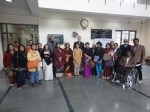
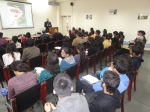
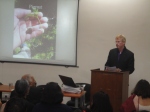
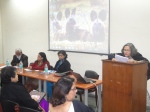
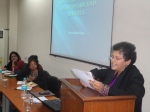
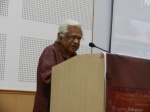
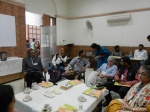
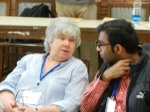
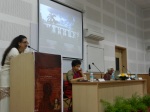
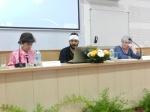
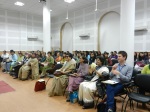
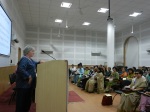
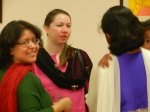
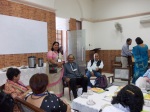
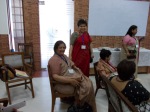
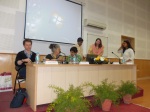
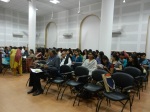
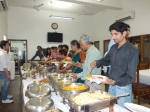
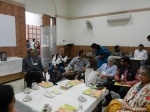
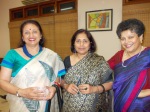
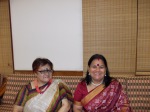
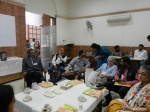
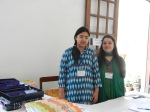
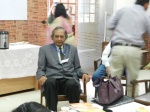
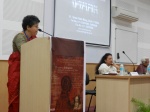
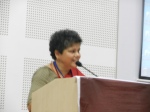
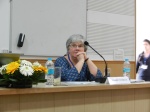
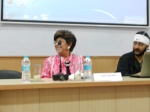
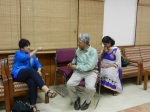
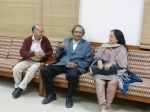
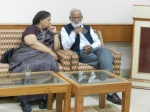
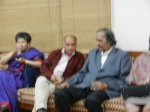
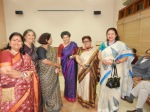
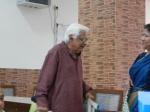
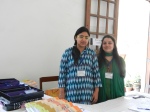
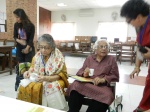
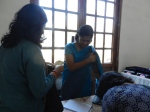
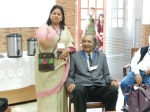
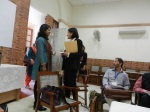
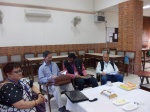
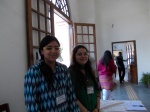
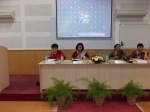
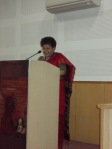
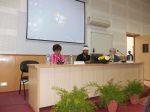
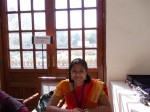

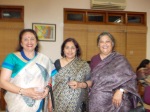
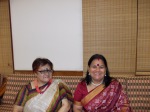
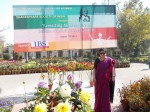
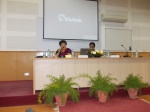
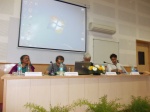
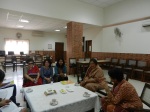
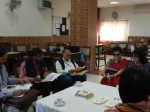
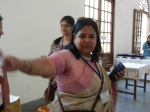
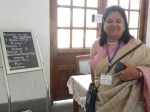
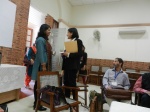
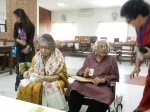
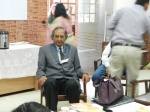
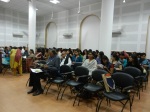



















Would you have some kind of online following of the seminar, or a publication? I’m too late for the CFP but I’m a research student in London studying Shakespeare and Cinema, with particular emphasis on Bollywood’s use of Shakespeare and would love to have attended the seminar.
Hi, I am TUHIN SANYAL, presently Asst. Prof. in the Dept. of English @ Tufanganj College, Cooch-Behar, under the North Bengal University. Mrs. Tapati Gupta, who, as I can see from the schedule above, shall present a paper, was my M.Phil. guide back in the year 2002, prior to which, during her tenure, I, as a student of Calcutta University, had written and directed a collage-play in blank-verse viz. MEASURE-UNMEASURE (based on Shakespeare’s plays) in the year 2000, for the MILLENNIUM LINK PROJECT (Shakespeare’s Millennium Birthday) AT STRATFORD-UPON-AVON. It was applauded by the media and acknowledgement (of it being archived) was also received from the organizers of the project at Stratford-upon-Avon. My request to you is to inform me via e-mail (tuhinsanyal@gmail.com) or phone (09830284462) if that work has at all been mentioned/incorporated by the speaker named ‘Ms. Thea Buckley’ of Shakespeare Institute, UK, in her paper titled– “Indian Shakespeare in the World Shakespeare Festival”.
I would have surely presented a paper in this gala seminar had not my Orientation Programme at Jadavpur University played spoil sport.
Regards–
Tuhin
(tuhinsanyal@gmail.com)
Nice to see your comment and know about your current activities. No, as far as I remember the work was not mentioned. There is so much being done in the area that in a short paper it is not always possible to say an awful lot.Hope to meet you again some day.
Tapati Gupta
Are you going to the Shakespeare seminar @ Jammu University (Theme- “REPUBLIC IN SHAKESPEARE”) in October? I’m going to present a paper comparing and contrasting Gonzalo’s Utopian Republic and Gandhi’s Ram Rajya, Therefore asking, whether you’ll be there. How are you?